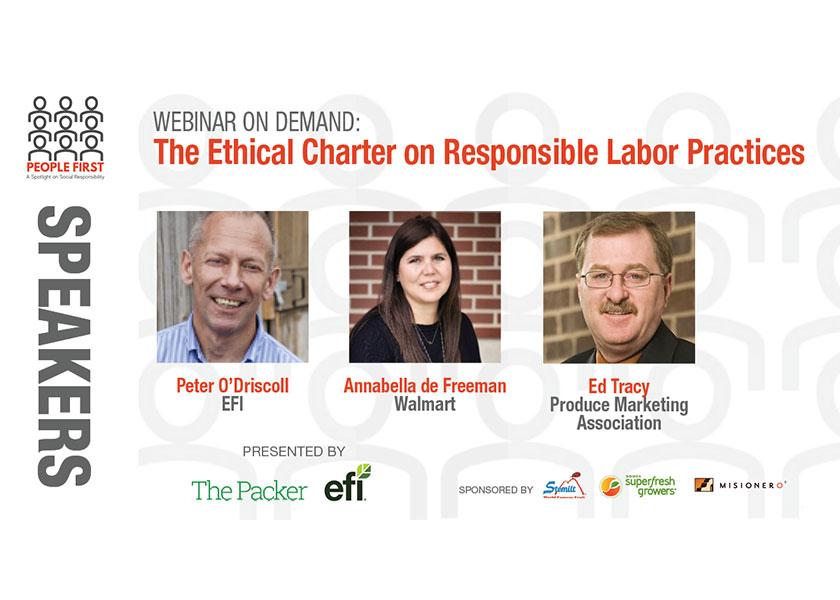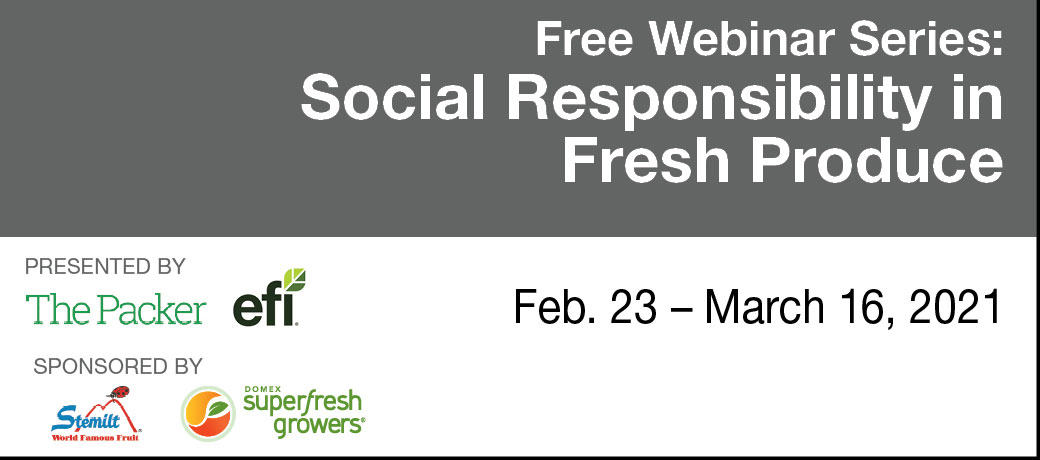Time is now to endorse Ethical Charter, panelists say

There is every good reason for produce operators to support the Ethical Charter on Responsible Labor Practices, and no reason not to.
That was the gist of an in-depth discussion of the Ethical Charter on Responsible Labor Practices during a virtual Farm Journal round table for the Equitable Food Initiative.
The Feb. 23 event featured a review of the history and adoption of the Ethical Charter since it was developed and what may be ahead for the initiative.
Moderated by The Packer’s Tom Karst, the event featured Peter O’Driscoll, executive director of the EFI; Anabella de Freeman, senior manager of sustainability strategic initiatives for produce for Walmart; and Ed Treacy, vice president of supply chain and sustainability for the Produce Marketing Association.
In an overview of the charter’s development, O’Driscoll noted a growing appetite from produce buyers for responsible labor practices, along with standard expectations of quality, competitive price, food safety and responsible labor practices.
A four-part series in 2014 by the Los Angeles Times put the spotlight on labor practices and conditions on produce farms in Mexico, which sparked industry action.
After several years of discussions by a joint committee created by the United Fresh Produce Association and PMA, the Ethical Charter on Responsible Labor Practices was established in 2018.
Read more: Myths & Realities of Social Compliance
De Freeman said treating workers with respect is important to Walmart, which has endorsed the Ethical Charter.
“At Walmart we see sustainability not just as an environmental (focus), but we see it as a (combination) of planet and people,” she said.
“Hopefully, as we progress, I think responsible labor practices will also be a minimum standard that is required for the products that we sell.”
O’Driscoll said there is a strong argument that the better the labor practices, the more likely companies will be able to implement effective sustainability, environmental and food safety practices.
The charter has several features under these categories:
- Respect for Laws at Work;
- Respect for Human Rights; and
- Respect for Professional Conduct.
O’Driscoll said the Ethical Charter is a way to affirm that produce operators are doing the right thing. Endorsing the charter can contribute to elevating employers to preferred status among workers, he said.
Read more: Integrating Worker Voice
Treacy of PMA said all buyers want quality, price, surety of supply and food safety. Four or five years ago, Treacy said one or two of the largest retailers started to have expectations of environmental sustainability and ethical treatment of workers.
“Now we are starting to see it is not just the big chains are doing it; it is across foodservice, it is across medium and smaller chains.”
Consumers are pushing retailers to engage on the sustainability and social responsibility, Treacy said.
“Everyone’s going down that path, and it is good business, it is good to ensure that their suppliers are going to be there for the long haul, that they are treating their people well and they are being responsible with the environment,” he said.
“Consumers are asking the questions, they want to ensure that the products that they are buying align with their personal values.”
Treacy said the drive is on to increase the number of endorsers of the charter in the industry.
The Ethical Charter website states what is necessary to become an endorser.
To become an endorser, a member of the leadership team commits in writing to:
- Encourage use of the principles contained in the Charter to promote responsible labor practices;
- Use the Charter to inform supply chain management standards and practices;
- Promote industry-wide awareness and understanding of the importance of supporting responsible labor practices throughout the supply chain;
- Harmonize supply chain monitoring mechanisms through recognition and acceptance of audits using the principles contained in the Charter, to help minimize the number of audits that farms and suppliers must undergo to demonstrate compliance; and
- Conduct ongoing dialogue with relevant stakeholders to support compliance with the standards throughout the industry.
Read more: Responsible Recruitment
“We’re getting more and more adoption of the Ethical Charter by companies in our industry,” Treacy said, noting the number of companies who have endorsed it has increased from 71 early last year to 85 this year.
“I won’t be happy until (the number of endorsers) is a four-digit number, and I really don’t see any reason why a company wouldn’t adopt it and endorse it.”
In five years, De Freeman predicted the Ethical Charter will be the “minimum standard” that everybody in the produce and floral industry will have to adopt and abide by.
“The language within the Ethical Charter is going to become the common language for everyone,” she said.
O’Driscoll said EFI and other groups are providing produce companies with demonstration of compliance with the charter by way of certifications.
“Certifications should be a means to (the) end of raising the bar and establishing that, just as you would need to demonstrate good food safety practices, you (can) demonstrate solid labor practices as well,” O’Driscoll said.
With the Ethical Charter, he said the industry is endorsing the concepts of worker management, collaboration, continuous improvement, engagement and channels of communication that EFI has built its certification principles around.








